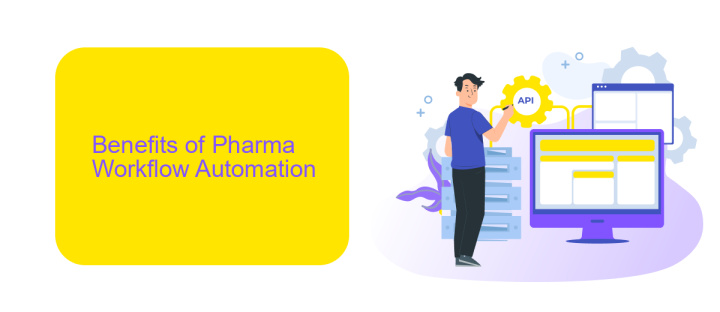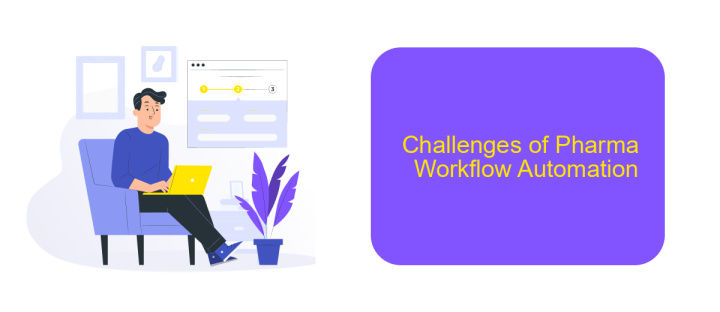Pharma Workflow Automation
In the rapidly evolving pharmaceutical industry, workflow automation is emerging as a pivotal solution to enhance efficiency, reduce errors, and accelerate drug development processes. By integrating advanced technologies such as AI, machine learning, and robotics, pharmaceutical companies can streamline operations, ensure compliance, and ultimately bring life-saving medications to market faster. This article explores the transformative impact of pharma workflow automation.
Introduction
In the ever-evolving pharmaceutical industry, efficiency and accuracy are paramount. Pharma workflow automation has emerged as a vital solution to streamline operations, reduce human error, and enhance productivity. By automating repetitive tasks, pharmaceutical companies can focus more on innovation and less on administrative burdens.
- Improved data accuracy and consistency
- Enhanced regulatory compliance
- Reduced operational costs
- Faster drug development cycles
- Seamless integration with existing systems
One of the key aspects of successful workflow automation is the integration of various systems and data sources. Tools like ApiX-Drive facilitate this by offering easy-to-use solutions for connecting different software and automating data transfer. This ensures that all parts of the workflow are synchronized, leading to more coherent and efficient processes. As a result, pharmaceutical companies can achieve higher levels of operational excellence and accelerate their time-to-market for new drugs.
Benefits of Pharma Workflow Automation

Pharma workflow automation significantly enhances efficiency by streamlining repetitive tasks, reducing human error, and ensuring compliance with industry regulations. Automated systems can handle everything from inventory management to patient data processing, enabling pharmaceutical professionals to focus on more critical tasks that require human expertise. This leads to faster drug development cycles, improved patient outcomes, and substantial cost savings for pharmaceutical companies.
Moreover, integrating various systems and applications is crucial for seamless workflow automation. Services like ApiX-Drive facilitate these integrations by allowing different software solutions to communicate effortlessly. This ensures that data flows smoothly between systems, eliminating bottlenecks and enhancing overall productivity. With the ability to automate and integrate, pharmaceutical companies can maintain a competitive edge, adapt to market changes quickly, and deliver high-quality products more efficiently.
Examples of Pharma Workflow Automation

Pharma workflow automation is revolutionizing the pharmaceutical industry by streamlining processes, reducing human error, and increasing efficiency. Examples of such automation can be found across various stages of pharmaceutical operations, from research and development to manufacturing and distribution.
- Research and Development: Automated data analysis tools help researchers quickly identify potential drug candidates by analyzing vast datasets.
- Manufacturing: Robotics and automated systems ensure precise mixing of compounds, reducing the risk of contamination and human error.
- Quality Control: Automated inspection systems using AI detect defects in products more accurately and faster than manual inspections.
- Supply Chain Management: Integration services like ApiX-Drive automate data exchange between different systems, ensuring real-time inventory tracking and reducing delays.
- Regulatory Compliance: Automated documentation and reporting tools help maintain compliance with regulatory standards, minimizing the risk of non-compliance penalties.
By leveraging these automation technologies, pharmaceutical companies can not only enhance their operational efficiency but also accelerate the time-to-market for new drugs, ultimately benefiting patients with faster access to innovative treatments.
Challenges of Pharma Workflow Automation

Pharma workflow automation presents numerous challenges that can hinder its successful implementation. One significant issue is the complexity of integrating various systems and platforms. Pharmaceutical companies often use a range of software for different processes, and ensuring these systems communicate effectively can be a daunting task.
Another challenge is data security and compliance. The pharmaceutical industry is heavily regulated, and maintaining compliance with standards such as HIPAA and GDPR is critical. Automation tools must be designed to handle sensitive data securely and ensure that all regulatory requirements are met.
- System integration complexities
- Data security and compliance
- High initial costs
- Employee resistance to change
Moreover, the initial costs associated with implementing automation can be high, which may deter some companies from adopting these technologies. Additionally, there is often resistance from employees who may be wary of changes to their workflow. Services like ApiX-Drive can help mitigate some of these challenges by offering seamless integration solutions, thereby simplifying the automation process.
- Automate the work of an online store or landing
- Empower through integration
- Don't spend money on programmers and integrators
- Save time by automating routine tasks
Future Directions of Pharma Workflow Automation
The future of pharma workflow automation is poised to be driven by advancements in artificial intelligence (AI) and machine learning (ML). These technologies will enable more sophisticated data analysis, predictive analytics, and decision-making processes, thereby enhancing the efficiency and accuracy of pharmaceutical operations. Additionally, the integration of Internet of Things (IoT) devices will allow for real-time monitoring and management of pharmaceutical manufacturing and distribution processes, ensuring higher levels of quality control and compliance with regulatory standards.
Another significant direction is the seamless integration of various software and tools to create a more cohesive and streamlined workflow. Services like ApiX-Drive will play a crucial role in this by facilitating the integration of disparate systems, allowing for automated data transfer and synchronization. This will not only reduce manual intervention but also minimize errors and improve overall productivity. As the industry continues to evolve, the adoption of blockchain technology for secure and transparent data management is also expected to become more prevalent, further revolutionizing the pharma workflow automation landscape.
FAQ
What is Pharma Workflow Automation?
How can Pharma Workflow Automation improve compliance?
What are the benefits of integrating different systems in Pharma Workflow Automation?
How difficult is it to implement Pharma Workflow Automation?
What are some common challenges in Pharma Workflow Automation?
Apix-Drive will help optimize business processes, save you from a lot of routine tasks and unnecessary costs for automation, attracting additional specialists. Try setting up a free test connection with ApiX-Drive and see for yourself. Now you have to think about where to invest the freed time and money!


